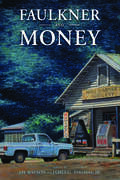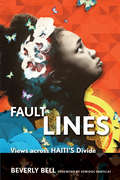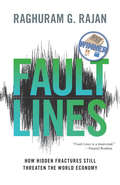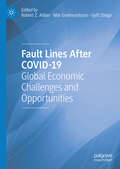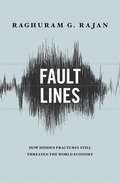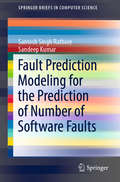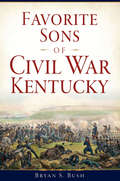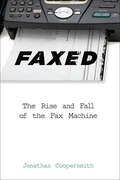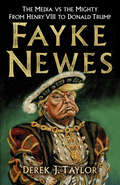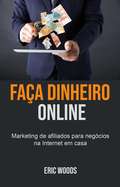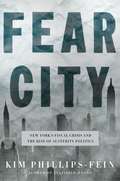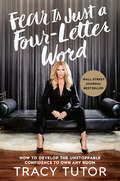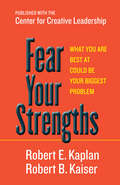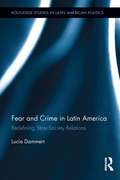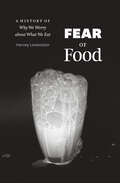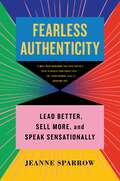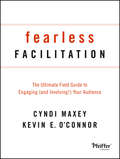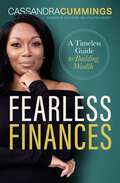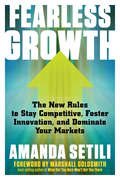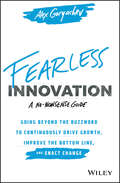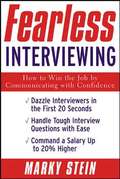- Table View
- List View
Faulkner and Money (Faulkner and Yoknapatawpha Series)
by Jay Watson and James G. ThomasContributions by Ted Atkinson, Gloria J. Burgess, David A. Davis, Sarah E. Gardner, Richard Godden, Ryan Heryford, Robert Jackson, Gavin Jones, Mary A. Knighton, Peter Lurie, John T. Matthews, Myka Tucker-Abramson, Michael Wainwright, Jay Watson, and Michael ZeitlinThe matter of money touches a writer's life at every point—in the need to make ends meet; in dealings with agents, editors, publishers, and bookstores; and in the choice of subject matter and the minutiae of imagined worlds. William Faulkner's Yoknapatawpha was no exception. The people and communities he wrote about stayed deeply entangled in personal, national, and even global networks of industry, commerce, and finance, as did the author himself. Faulkner's economic biography often followed, but occasionally bucked, the tumultuous economic trends of the twentieth century. The Faulkner met within these pages is among modern literature's most incisive and encyclopedic critics of what one contemporary theorist calls the madness of economic reason. Faulkner and Money brings together a distinguished group of scholars to explore the economic contexts of Faulkner's life and work, to follow the proverbial money toward new insights into the Nobel Laureate and new questions about his art. Essays in this collection address economies of debt and gift giving in Intruder in the Dust; the legacies of commodity fetishism in Sanctuary and of twentieth-century capitalism's financial turn in The Town; the pegging of self-esteem to financial acumen in the career of The Sound and the Fury's Jason Compson; the representational challenges posed by poverty and failure in Faulkner's Frenchman's Bend tales; the economics of regional readership and the Depression-era literary market; the aesthetic, monetary, and psychological rewards of writing for Hollywood; and the author's role as benefactor to an aspiring African American college student in the 1950s.
Fault Lines
by Beverly BellBeverly Bell, an activist and award-winning writer, has dedicated her life to working for democracy, women's rights, and economic justice in Haiti and elsewhere. Since the 7. 0 magnitude earthquake of January 12, 2010, that struck the island nation, killing more than a quarter-million people and leaving another two million Haitians homeless, Bell has spent much of her time in Haiti. Her new book, Fault Lines, is a searing account of the first year after the earthquake. Bell explores how strong communities and an age-old gift culture have helped Haitians survive in the wake of an unimaginable disaster, one that only compounded the preexisting social and economic distress of their society. The book examines the history that caused such astronomical destruction. It also draws in theories of resistance and social movements to scrutinize grassroots organizing for a more just and equitable country. Fault Lines offers rich perspectives rarely seen outside Haiti. Readers accompany the author through displaced persons camps, shantytowns, and rural villages, where they get a view that defies the stereotype of Haiti as a lost nation of victims. Street journals impart the author's intimate knowledge of the country, which spans thirty-five years. Fault Lines also combines excerpts of more than one hundred interviews with Haitians, historical and political analysis, and investigative journalism. Fault Lines includes twelve photos from the year following the 2010 earthquake. Bell also investigates and critiques U. S. foreign policy, emergency aid, standard development approaches, the role of nongovernmental organizations, and disaster capitalism. Woven through the text are comparisons to the crisis and cultural resistance in Bell's home city of New Orleans, when the levees broke in the wake of Hurricane Katrina. Ultimately a tale of hope, Fault Lines will give readers a new understanding of daily life, structural challenges, and collective dreams in one of the world's most complex countries.
Fault Lines
by Raghuram G. RajanRaghuram Rajan was one of the few economists who warned of the global financial crisis before it hit. Now, as the world struggles to recover, it's tempting to blame what happened on just a few greedy bankers who took irrational risks and left the rest of us to foot the bill. In Fault Lines, Rajan argues that serious flaws in the economy are also to blame, and warns that a potentially more devastating crisis awaits us if they aren't fixed. Rajan shows how the individual choices that collectively brought about the economic meltdown--made by bankers, government officials, and ordinary homeowners--were rational responses to a flawed global financial order in which the incentives to take on risk are incredibly out of step with the dangers those risks pose. He traces the deepening fault lines in a world overly dependent on the indebted American consumer to power global economic growth and stave off global downturns. He exposes a system where America's growing inequality and thin social safety net create tremendous political pressure to encourage easy credit and keep job creation robust, no matter what the consequences to the economy's long-term health; and where the U.S. financial sector, with its skewed incentives, is the critical but unstable link between an overstimulated America and an underconsuming world. In Fault Lines, Rajan demonstrates how unequal access to education and health care in the United States puts us all in deeper financial peril, even as the economic choices of countries like Germany, Japan, and China place an undue burden on America to get its policies right. He outlines the hard choices we need to make to ensure a more stable world economy and restore lasting prosperity.
Fault Lines
by Raghuram G. RajanRaghuram Rajan was one of the few economists who warned of the global financial crisis before it hit. Now, as the world struggles to recover, it's tempting to blame what happened on just a few greedy bankers who took irrational risks and left the rest of us to foot the bill. In Fault Lines, Rajan argues that serious flaws in the economy are also to blame, and warns that a potentially more devastating crisis awaits us if they aren't fixed.Rajan shows how the individual choices that collectively brought about the economic meltdown--made by bankers, government officials, and ordinary homeowners--were rational responses to a flawed global financial order in which the incentives to take on risk are incredibly out of step with the dangers those risks pose. He traces the deepening fault lines in a world overly dependent on the indebted American consumer to power global economic growth and stave off global downturns. He exposes a system where America's growing inequality and thin social safety net create tremendous political pressure to encourage easy credit and keep job creation robust, no matter what the consequences to the economy's long-term health; and where the U.S. financial sector, with its skewed incentives, is the critical but unstable link between an overstimulated America and an underconsuming world.In Fault Lines, Rajan demonstrates how unequal access to education and health care in the United States puts us all in deeper financial peril, even as the economic choices of countries like Germany, Japan, and China place an undue burden on America to get its policies right. He outlines the hard choices we need to make to ensure a more stable world economy and restore lasting prosperity.
Fault Lines After COVID-19: Global Economic Challenges and Opportunities
by Robert Z. Aliber Gylfi Zoega Már GudmundssonThis book explores the central economic and political issues defining the modern world. With contributions from a number of world renowned economists, a range of topical debates are discussed in an accessible and practical manner. The topics discussed include the current economic and political backdrop, global economic shifts, challenges within central banking and financial integration, the international monetary and financial system, and geopolitical tensions. Particular attention is given to the transition to a low carbon economy, the perils of public debt, the post-COVID-19 recovery, and the conflict in Ukraine.This book aims to envisage the economic challenges and opportunities that will be faced in the years to come. It will be relevant to students, researchers, and policymakers interested in economic policy and the political economy.Chapter-No.17 is available open access under a Creative Commons Attribution 4.0 International License via link.springer.com.
Fault Lines: How Hidden Fractures Still Threaten the World Economy
by Raghuram G. RajanRaghuram Rajan was one of the few economists who warned of the global financial crisis before it hit. Now, as the world struggles to recover, it's tempting to blame what happened on just a few greedy bankers who took irrational risks and left the rest of us to foot the bill. In Fault Lines, Rajan argues that serious flaws in the economy are also to blame, and warns that a potentially more devastating crisis awaits us if they aren't fixed. Rajan shows how the individual choices that collectively brought about the economic meltdown--made by bankers, government officials, and ordinary homeowners--were rational responses to a flawed global financial order in which the incentives to take on risk are incredibly out of step with the dangers those risks pose. He traces the deepening fault lines in a world overly dependent on the indebted American consumer to power global economic growth and stave off global downturns. He exposes a system where America's growing inequality and thin social safety net create tremendous political pressure to encourage easy credit and keep job creation robust, no matter what the consequences to the economy's long-term health; and where the U. S. financial sector, with its skewed incentives, is the critical but unstable link between an overstimulated America and an underconsuming world. In Fault Lines, Rajan demonstrates how unequal access to education and health care in the United States puts us all in deeper financial peril, even as the economic choices of countries like Germany, Japan, and China place an undue burden on America to get its policies right. He outlines the hard choices we need to make to ensure a more stable world economy and restore lasting prosperity.
Fault Prediction Modeling for the Prediction of Number of Software Faults (SpringerBriefs in Computer Science)
by Sandeep Kumar Santosh Singh RathoreThis book addresses software faults—a critical issue that not only reduces the quality of software, but also increases their development costs. Various models for predicting the fault-proneness of software systems have been proposed; however, most of them provide inadequate information, limiting their effectiveness. This book focuses on the prediction of number of faults in software modules, and provides readers with essential insights into the generalized architecture, different techniques, and state-of-the art literature. In addition, it covers various software fault datasets and issues that crop up when predicting number of faults. A must-read for readers seeking a “one-stop” source of information on software fault prediction and recent research trends, the book will especially benefit those interested in pursuing research in this area. At the same time, it will provide experienced researchers with a valuable summary of the latest developments.
Fault in American Contract Law
by Omri Ben-Shahar Ariel PoratRepresenting an unprecedented joint effort from top scholars in the field, this volume collects original contributions to examine the fundamental role of "fault" in contract law. Is it immoral to breach a contract? Should a breaching party be punished more harshly for willful breach? Does it matter if the victim of breach engaged in contributory fault? Is there room for a calculus of fault within the "efficient breach" framework? For generations, contract liability has been viewed as a no-fault regime, in sharp contrast to tort liability. Is this dichotomy real? Is it justified? How do the American and European traditions compare? In exploring these and related issues, the essays in this volume bring together a variety of outlooks, including economic, psychological, philosophical, and comparative approaches to law.
Favorite Sons of Civil War Kentucky (Civil War Series)
by Bryan S. BushWhen the Civil War broke out, thousands of Kentuckians struggled to maintain the state’s neutrality in deciding which side to support. Although Kentucky was a slaveholding state, most of the population did not wish to secede from the Union. More than 140,000 Kentucky solders fought on both sides, in the Eastern and Western Theaters. Some of those who emerged from these battlegrounds are among the state’s favorite local heroes. Join historian and author Bryan S. Bush as he recounts the journeys of these brave men who fought to build and maintain the legacy of the Bluegrass State.
Faxed: The Rise and Fall of the Fax Machine (Johns Hopkins Studies in the History of Technology)
by Jonathan CoopersmithThe intriguing story of the rise and fall—and unexpected persistence—of the fax machine illustrates the close link between technology and culture.Co-Winner of the Hagley Prize in Business History of the Business History ConferenceFaxed is the first history of the facsimile machine—the most famous recent example of a tool made obsolete by relentless technological innovation. Jonathan Coopersmith recounts the multigenerational, multinational history of the device from its origins to its workplace glory days, in the process revealing how it helped create the accelerated communications, information flow, and vibrant visual culture that characterize our contemporary world.Most people assume that the fax machine originated in the computer and electronics revolution of the late twentieth century, but it was actually invented in 1843. Almost 150 years passed between the fax’s invention in England and its widespread adoption in tech-savvy Japan, where it still enjoys a surprising popularity. Over and over again, faxing’s promise to deliver messages instantaneously paled before easier, less expensive modes of communication: first telegraphy, then radio and television, and finally digitalization in the form of email, the World Wide Web, and cell phones. By 2010, faxing had largely disappeared, having fallen victim to the same technological and economic processes that had created it. Based on archival research and interviews spanning two centuries and three continents, Coopersmith’s book recovers the lost history of a once-ubiquitous technology. Written in accessible language that should appeal to engineers and policymakers as well as historians, Faxed explores themes of technology push and market pull, user-based innovation, and "blackboxing" (the packaging of complex skills and technologies into packages designed for novices) while revealing the inventions inspired by the fax, how the demand for fax machines eventually caught up with their availability, and why subsequent shifts in user preferences rendered them mostly passé.
Fayke Newes: The Media vs the Mighty, From Henry VIII to Donald Trump
by Derek Taylor‘Fake news.’ ‘Dishonest press.’ ‘Racist.’ ‘Mentally unstable.’ The insults President Donald Trump and the American news media hurl at each other are nothing new. In Tudor England, printed papers branded the monarch a ‘horrible monster’ and were in turn accused of publishing ‘false fables’. Ever since the invention of the printing press, those in power have seen mass communication as a dangerous threat that usurps their ability to tell people what to think and is capable of stirring up discontent – or even rebellion. In Fayke Newes, historian and international journalist Derek Taylor tracks this long and bloody fight between the press and those in power, through the lives of the men and women who got caught up in the battle. On a journey through the centuries, we criss-cross the Atlantic between Britain and America and discover that neither governments nor journalists have always told the truth.
Faça dinheiro online: Marketing de afiliados para negócios na Internet em casa
by Eric WoodsAs informações incluídas neste livro vão-te guiar por algumas das características mais úteis do Google Classroom (Google Sala de Aula), familiarizando-te com o programa e todas as suas eficazes funções. Quer sejas uma mãe que fica em casa, querendo ganhar algum dinheiro extra, ou alguém com o desejo de construir um negócio on-line de sucesso, este livro vai-te guiar passo a passo por estratégias comprovadas para iniciares o teu próprio negócio no Ebay. Uma das maneiras de ficar rico e criar riqueza é entender as diferentes maneiras em qual o rendimento pode ser gerado. Costuma-se dizer que a classe baixa-média trabalha para ter dinheiro enquanto que o dinheiro trabalha para os ricos. A chave para a criação de riqueza encontra-se dentro dessa simples afirmação. Pega a tua cópia hoje ao clicares no botão na parte superior desta página!
Fear City: New York's Fiscal Crisis and the Rise of Austerity Politics
by Kim Phillips-FeinAn epic, riveting history of New York City on the edge of disaster—and an anatomy of the austerity politics that continue to shape the world today When the news broke in 1975 that New York City was on the brink of fiscal collapse, few believed it was possible. How could the country’s largest metropolis fail? How could the capital of the financial world go bankrupt? Yet the city was indeed billions of dollars in the red, with no way to pay back its debts. Bankers and politicians alike seized upon the situation as evidence that social liberalism, which New York famously exemplified, was unworkable. The city had to slash services, freezewages, and fire thousands of workers, they insisted, or financial apocalypse would ensue. In this vivid account, historian Kim Phillips-Fein tells the remarkable story of the crisis that engulfed the city. With unions and ordinary citizens refusing to accept retrenchment, the budget crunch became a struggle over the soul of New York, pitting fundamentally opposing visions of the city against each other. Drawing on never-before-used archival sources and interviews with key players in the crisis,Fear City shows how the brush with bankruptcy permanently transformed New York—and reshaped ideas about government across America. At once a sweeping history of some of the most tumultuous times in New York's past, a gripping narrative of last-minute machinations and backroom deals, and an origin story of the politics of austerity,Fear City is essential reading for anyone seeking to understand the resurgent fiscal conservatism of today.
Fear Is Just a Four-Letter Word: How to Develop the Unstoppable Confidence to Own Any Room
by Tracy TutorFrom the first female real estate broker on Million Dollar Listing LA, a no-nonsense guide to analyzing big egos, deflecting power plays, and taking control of any room.Behind Tracy Tutor's on-screen persona is an uncanny knack for projecting confidence in the most intimidating of circumstances. The breezy, tough-talking, utterly inimitable businesswoman has rivaled her male co-stars to land increasingly high-profile deals in the world of LA real estate. Now, Tracy is leveraging her years of experience to write the go-to manual for any woman struggling to convince people she's in charge.If you get thrown off course by narcissistic personalities or freaked out by high-stakes situations, don't assume you're weak. When fear is running the show, you get wrapped up in your head and start missing important cues. Yes, the people you're dealing with seem scary, but they're more predictable than you think. Once you understand them, it's easy to push the right levers of influence to get what you want.Through candid, hilarious stories of her rise through a world of misogyny and cutthroat business dealings (text message screen shots from creeps included!), Tracy offers a crash course in the psychology of power dynamics and social signaling. You'll learn: • What five things you should always find out about someone before you meet them • How to choose the perfect outfit for an important meeting, even when dressing on a budget • When and how to use humor strategically to lighten the mood and command authorityThis book is a must-read for any ambitious woman who wants to win her next business confrontation before she even walks into the room.
Fear Is Not the Boss of You: How to Get Out of Your Head and Live the Life You Were Made For
by Jennifer AllwoodYOUR FUTURE AND YOUR DESTINY ARE TOO IMPORTANT. DISCOVER HOW TO GET UNSTUCK AND OVER YOUR FEAR.This book is for any woman who has ever been overwhelmed with indecision, paralyzed with fear, or just plain stuck. With no-nonsense biblical truth, Fear Is Not the Boss of You is a loving kick in the backside that will catapult you into ACTION. Successful entrepreneur, business coach, and girl next door Jennifer Allwood is your guide to show you why you can't stay stuck, teaching you how to get out of your own way and get on the road to fulfilling the life of your dreams--even if you're afraid.Whether you're thinking of launching a new business, adopting a child, writing a book, or competing in a triathlon, Jennifer will motivate you to move from paralyzing fear into courageous obedience and action. With stories, straightforward truth, and practical tips you can apply today, Jennifer will show you how to:Identify how and where you are stuckDetermine what's holding you backGet out of your own wayEmpower those around youExperience the incredible joy that comes from trusting a big God to do big things in you and through youThis is your gutsy invitation to go after the big dream God has called you to . . . because fear is not the boss of you.
Fear Your Strengths: What You Are Best at Could Be Your Biggest Problem
by Robert E. Kaplan Robert B. KaiserOnce you’ve discovered your strengths, you need to discover something else: your strengths can work against you. Many leaders know this on some intuitive level, and they see it in others. But they don’t see it as clearly in themselves. Mainly, they think of leadership development as working on their weaknesses. No wonder. The tools used to assess managers are not equipped to pick up on overplayed strengths—when more is not better. Nationally recognized leadership experts Bob Kaplan and Rob Kaiser have conducted thousands of assessments of senior executives designed to determine when their strengths serve them well—versus betray them. In this groundbreaking book, they draw on their data and practical experience to identify four fundamental leadership qualities, each positive in and of itself but each of which, if overemphasized, can seriously compromise your effectiveness. Most leaders, they’ve found, are “lopsided”—they favor certain qualities to the exclusion of others without realizing it. The trick is to keep all four in balance. Fear Your Strengths provides tools to help you become aware of your leadership leanings and excesses and provides insights for combatting the mindset that encourages them. It offers a practical psychology of leadership, a better way for leaders to calibrate their performance so that you can make sure your strengths don’t overpower you but rather move you—and your organization—forward.
Fear and Crime in Latin America: Redefining State-Society Relations (Routledge Studies in Latin American Politics)
by Lucía DammertThe feeling of insecurity is a little known phenomenon that has been only partially explored by social sciences. However, it has a deep social, cultural and economic impact and may even contribute to define the very structures of the state. In Latin America, fear of crime has become an important stumbling block in the region’s process of democratization. After long spells of dictatorships and civil wars, violence in the region was supposed to be under control yet crime rates have continued to skyrocket and citizens remain fearful. This analytical puzzle has troubled researchers and to date there is no publication which explores this problem. Based on a wealth of cutting edge qualitative and quantitative research, Lucía Dammert proposes a unique theoretical perspective which includes a sociological, criminological and political analysis to understand fear of crime. She describes its linkages to issues such as urban segregation, social attitudes, institutional trust, public policies and authoritarian discourses in Chile’s recent past. Looking beyond Chile, Dammert also includes a regional comparative perspective allowing readers to understand the complex elements underpinning this situation. Fear and Crime in Latin America challenges many assumptions and opens an opportunity to discuss an issue that affects everyone with key societal and personal costs. As crime rates increase and states become even more fragile, fear of crime as a social problem will continue to have an important impact in Latin America.
Fear of Food: A History of Why We Worry about What We Eat
by Harvey LevensteinAn &“entertaining and enlightening&” history of the scares, scams, and pseudoscience that have made food a source of anxiety in America (The Boston Globe). Are eggs the perfect protein, or cholesterol bombs? Is red wine good for my heart, or bad for my liver? Will pesticides and processed foods kill me? In this book, food historian Harvey Levenstein encourages us to take a deep breath, and reveals the people and vested interests who have created and exploited so many worries surrounding the subject of what we eat. He tells of the prominent scientists who first warned about deadly germs and poisons, and those who charged that processing foods robs them of life-giving vitamins and minerals. These include Nobel laureate Eli Metchnikoff, who advised that yogurt would enable people to live to 140, and Elmer McCollum, the &“discoverer&” of vitamins, who tailored his warnings about deficiencies to suit the food producers who funded him. He also highlights how companies have taken advantage of these concerns—by marketing their products to the fear of the moment. Fear of Food is a lively look at the food industry and American culture, as well as a much-needed voice of reason; Levenstein expertly questions these stories of constantly changing advice, and helps free us from irrational fears so we can rediscover the joy of eating. &“Guides us through an entertaining series of obsessions—from the outsized fear of flies spreading germs (leading to the 1905 invention of the fly swatter) to a panic about germ-ridden cats infecting human food (which led to a 1912 Chicago public health warning that felines were &‘extremely dangerous to humanity&’)…[a] roster of American food nuttiness.&”—TheBoston Globe &“[Takes] readers through a succession of American fads and panics, from an epidemic of &‘germophobia&’ at the start of the twentieth century to fat phobia at its end. He exposes the instigators of these panics: not only the hucksters and opportunists but also the scientists and health experts.&”—Times Literary Supplement
Fear: The Inhibitor of Action--How Iconoclasts Free Themselves from Fear
by Gregory BernsHumans possess a stress response system that evolved in very different circumstances than exist today. In fact, the stress system is so important and active that it can override every other system in the brain. It reacts when provoked, and this reaction is powerful enough to derail many of the most innovative people out there. How does an iconoclast squelch the fear of the unknown, the fear of physical harm, and the fear of social isolation that come along with challenging conventional thinking? This chapter describes some cognitive strategies for keeping the fear system under control.
Fearless Authenticity: Lead Better, Sell More & Speak Sensationally
by Jeanne SparrowWhat is the secret to success? Expressing your unique, individual value with fearless authenticity. How we communicate—the words we say and how we say them—has the profound power to change lives, form connections, and create communities. But many of us struggle to translate our ideas, values, and dreams into words. In Fearless Authenticity: Lead Better, Sell More, and Speak Sensationally, speaker, TV personality, and radio host Jeanne Sparrow provides a roadmap to unlock your unique value, gain the courage and confidence to connect authentically and fearlessly with your audience. The process begins with the mantra: Be Brave, Be Free, Be You. With strategic advice and instructional &“authenticity actions&” informed by Sparrow&’s extensive media experience, you&’ll learn how to identify the unique parts of your perspective, opinion, and experience, and how to step into your individual power that will transform your professional and personal life. Whether you&’re looking to move forward in your career or make better connections in your life, Fearless Authenticity is an honest conversation about success and personal power—an easy-to-follow guide whenever there&’s a team to lead, a sale to close, a speech to deliver. This book is for anyone who wants to stand out, speak up, and be heard.
Fearless Facilitation: The Ultimate Field Guide to Engaging (and Involving!) Your Audience
by Kevin O'Connor Cyndi MaxeyAs the workforce ages and younger trainers and managers emerge, facilitation skills take on a new importance and, with the increased use of social networks, new facilitation skills are needed. Written by two facilitation gurus, this book shows how to make any learning environment come alive. It outlines proven guidelines any trainer can use to unify groups, inspire creativity, and get audiences, teams, and colleagues to speak up, talk back, participate, and engage in meetings.
Fearless Finances: A Timeless Guide to Building Wealth
by Cassandra CummingsBUILD GENERATIONAL WEALTH WITH CLEAR AND ACTIONABLE INVESTMENT STRATEGIESCassandra Cummings, leading financial expert, and founder of The Stocks & Stilettos Society, shows women how to crush their financial goals, overcome their fears, and grow their wealth through the power of investing.Historically, women of color have been shut out of the wealth-building game. Cassandra Cummings has made it her mission to change that by creating a vibrant and successful online community of more than 100,000 women investors. In her new book, Cassandra brings the powerful lessons of their achievements to you.In this book, Cassandra will teach you how to:Conquer longstanding fears around moneyDevelop a firm foundation for you and your familyInvest in the stock market for wealth creation and legacy buildingPrepare for a lifelong winning financial seasonFearless Finances walks you through the keys to building your success squad of trusted experts, as well as women who kicked fear out of the way to achieve their financial dreams. Now, so can you.
Fearless Growth: The New Rules to Stay Competitive, Foster Innovation, and Dominate Your Markets
by Amanda SetiliIs your company fast, creative, and adaptable enough to survive in today's volatile world?In our age of disruption, your company must be agile and courageous—yet it's easy to react to today's business climate with fear and indecision. Don't make that mistake. To move quickly and intelligently to the changes unfolding around us, you must be sure all levels and functions in your businesses are creative and responsive.Packed with practical examples, tools, and guidance, Fearless Growth provides new rules to enable your company to adapt faster, move faster, and grow faster. You will learn how to:Capitalize on uncertainties in your market, rather than letting them slow you down.Leverage the talent, assets, technology, and data that exist outside your company.Get in sync with customers, gain early insight into changing needs, and bring the right solutions to market.Open the floodgates of employee creativity, empowering employees to respond quickly and effectively to emerging opportunities.
Fearless Innovation: Going Beyond the Buzzword to Continuously Drive Growth, Improve the Bottom Line, and Enact Change
by Alex GoryachevIs Innovation just an overused buzzword? A waste of time? A mere marketing ploy? Author Alex Goryachev has a simple, resounding response to such questions: No! The Fourth Industrial Revolution is driving change at an unprecedented pace, level, and intensity that is impacting businesses across industries, not to mention our everyday lives. We are rapidly blurring the physical and the digital, transforming the way we live and, in some sense, what it even means to be human. Whether we run a startup or multinational, a nonprofit or academic institution, a city or a whole country, we need to embrace this change to not just survive but thrive under these new realities. In Fearless Innovation, Cisco’s Managing Director of Innovation Strategy and Programs explores how, no matter their function, leaders and managers can cut through the noise to understand change and deliver real results. Goryachev’s actionable, consistent, and timeless innovation principles offer a blueprint to driving growth, enacting change, increasing the bottom line, and creating clear measurable value. Featuring diverse case studies of some of today’s most innovative organizations, historical observations, first-hand experience, and a look at where innovation is thriving, and why, this down-to-earth guide provides advice and clear steps on how to: Get teams to embrace innovation beyond empty slogans Focus on execution of innovation through leadership and strategy Measure the real effects of innovation to showcase ROI and attract investment Break down org silos by empowering effective, diverse, and inclusive teams Drive co-innovation through win-win ecosystem-wide partnerships Organize innovation teams and orchestrate outcomes by leveraging organizational DNA Communicate the value of innovation to differentiate ourselves from competition Written for any organization that wants to stay relevant in the 21st Century, and even beyond, Fearless Innovation offers a step-by-step guide for getting past the confusion, overcoming fear, and getting down to business to create an environment of true innovation.
Fearless Interviewing: How to Win the Job by Communicating with Confidence
by Marky SteinA proactive new strategy for removing anxiety, and regaining control, throughout the job interview process "Marky Stein's book is wonderful. She gives us a thorough analysis of the whole interviewing process. Fearless Interviewing is clear, kind, and full of good advice. . . . Highly recommended. "--Barbara Sher, author of Live the Life That You Love. A job interview is one of life's most stressful and challenging experiences. Fearless Interviewing presents a strategic approach to interviewing, one that tips the scales back in favor of the job applicant. It provides useful advice on all aspects of the interviewing process, including how to: * Dazzle interviewers in the first 20 seconds * Handle tough interview questions with ease * Command a salary up to 20 percent higher.
